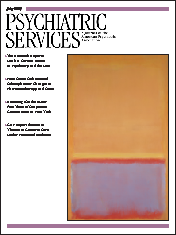Brief Reports: Outcomes of Patients in a Low-Intensity, Short-Duration Involuntary Outpatient Commitment Program
Abstract
This study examined the outcomes of patients in a low-intensity, short-duration involuntary outpatient commitment program. After release from inpatient commitment, one group (N=150) entered an involuntary outpatient commitment program that lasted up to six months; a comparison group (N=140) was released into the community without further involuntary care. After the analysis adjusted for confounding variables, patients who were in the involuntary outpatient commitment program had greater use of follow-up outpatient and residential services and psychotropic medications than patients in the comparison group. No differences were found between the groups in follow-up acute psychiatric hospitalization or arrests. Low-intensity, short-duration involuntary outpatient commitment appears to have a limited, but important, impact.



